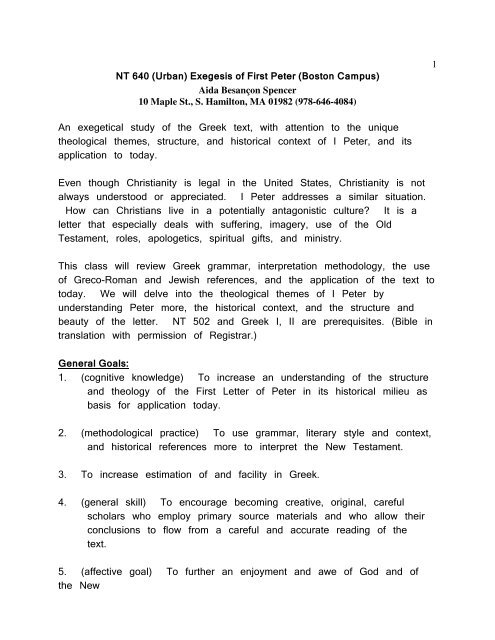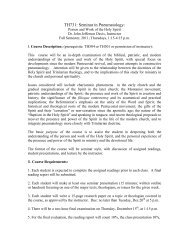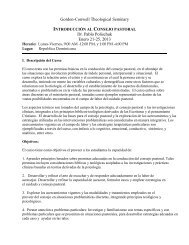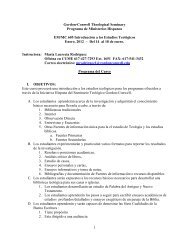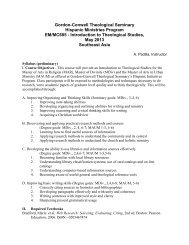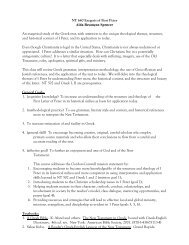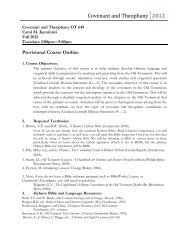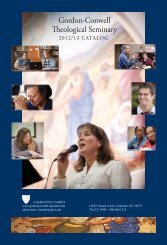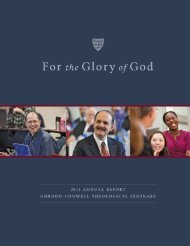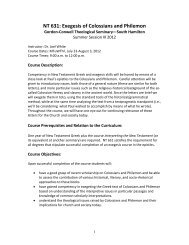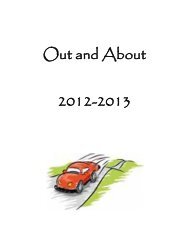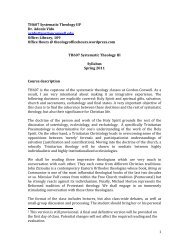1 NT 640 (Urban) Exegesis of First Peter (Boston Campus) - Gordon ...
1 NT 640 (Urban) Exegesis of First Peter (Boston Campus) - Gordon ...
1 NT 640 (Urban) Exegesis of First Peter (Boston Campus) - Gordon ...
Create successful ePaper yourself
Turn your PDF publications into a flip-book with our unique Google optimized e-Paper software.
<strong>NT</strong> <strong>640</strong> (<strong>Urban</strong>) <strong>Exegesis</strong> <strong>of</strong> <strong>First</strong> <strong>Peter</strong> (<strong>Boston</strong> <strong>Campus</strong>)<br />
Aida Besançon Spencer<br />
10 Maple St., S. Hamilton, MA 01982 (978-646-4084)<br />
An exegetical study <strong>of</strong> the Greek text, with attention to the unique<br />
theological themes, structure, and historical context <strong>of</strong> I <strong>Peter</strong>, and its<br />
application to today.<br />
Even though Christianity is legal in the United States, Christianity is not<br />
always understood or appreciated. I <strong>Peter</strong> addresses a similar situation.<br />
How can Christians live in a potentially antagonistic culture? It is a<br />
letter that especially deals with suffering, imagery, use <strong>of</strong> the Old<br />
Testament, roles, apologetics, spiritual gifts, and ministry.<br />
This class will review Greek grammar, interpretation methodology, the use<br />
<strong>of</strong> Greco-Roman and Jewish references, and the application <strong>of</strong> the text to<br />
today. We will delve into the theological themes <strong>of</strong> I <strong>Peter</strong> by<br />
understanding <strong>Peter</strong> more, the historical context, and the structure and<br />
beauty <strong>of</strong> the letter. <strong>NT</strong> 502 and Greek I, II are prerequisites. (Bible in<br />
translation with permission <strong>of</strong> Registrar.)<br />
General Goals:<br />
1. (cognitive knowledge) To increase an understanding <strong>of</strong> the structure<br />
and theology <strong>of</strong> the <strong>First</strong> Letter <strong>of</strong> <strong>Peter</strong> in its historical milieu as<br />
basis for application today.<br />
2. (methodological practice) To use grammar, literary style and context,<br />
and historical references more to interpret the New Testament.<br />
3. To increase estimation <strong>of</strong> and facility in Greek.<br />
4. (general skill) To encourage becoming creative, original, careful<br />
scholars who employ primary source materials and who allow their<br />
conclusions to flow from a careful and accurate reading <strong>of</strong> the<br />
text.<br />
5. (affective goal) To further an enjoyment and awe <strong>of</strong> God and <strong>of</strong><br />
the New<br />
1
Testament.<br />
This course addresses the <strong>Gordon</strong>-Conwell mission statement by:<br />
1. Encouraging students to become more knowledgeable <strong>of</strong> the<br />
structure and theology <strong>of</strong> 1 <strong>Peter</strong> in its historical milieu and more<br />
competent in using interpretative and application skills learned in <strong>NT</strong><br />
502 and Greek 1 and 2 (mission goal 1);<br />
2. Introducing students to the Christian scholarship issues in 1 <strong>Peter</strong><br />
(goal 2);<br />
3. Helping students mature in their character, outlook, conduct,<br />
relationships, and involvement in society by the teacher’s model,<br />
class dialogue, mentoring opportunities, and prayer (goal 4);<br />
4. Providing resources and strategies that will lead to effective local<br />
and global ministry, missions, evangelism, and discipleship as evident<br />
in 1 <strong>Peter</strong> (goals 3, 5, 6).<br />
Textbooks:<br />
1. A Greek Bible. K. Aland and others. The New Testament in<br />
Greek, bound with Greek-English Dictionary. 4th ed. rev. New<br />
York: American Bible Society, 2001. (978-3-438-05113-4)<br />
2. Sakae Kubo. A Reader's Greek-English Lexicon <strong>of</strong> the New<br />
Testament. Grand Rapids: Zondervan, 1975. PA 881.K8 (0310-<br />
26920-2) or Michael H. Burer and Jeffrey E. Miller. A New<br />
Reader’s Lexicon <strong>of</strong> the Greek New Testament. Grand Rapids:<br />
Kregel, 2008. (978-0-8254-2009-2)<br />
Readings will be made in:<br />
Eusebius. The History <strong>of</strong> the Church from Christ to Constantine. Trans.<br />
G. A.<br />
Williamson. New York: Penguin, 1989. BR 160.E5 W676 (0-14-<br />
044535-8)<br />
or Eusebius: The Church History. Trans. Paul L. Maier. Grand<br />
Rapids: Kregel, 1999<br />
(0-8254-3328-2) (Spanish trans. Also available)<br />
2
Loeb Classical Library. Cambridge: Harvard University Press: 1927-28:<br />
Tacitus V. Annals. (0-674-99355-6/1) Aristotle XXI. Politics. (0-674-<br />
99291-7) Oppian (Colluthus, Tryphiodorus). Halieutica. (0-674-99241-5)<br />
Josephus. The Jewish War. Books V-VII (0-674-99569-7/4) or The Works<br />
<strong>of</strong> Josephus. Trans. W. Whiston. Peabody: Hendrickson, 1987) (updated<br />
version with Loeb numbering)<br />
The Mishnah. Trans. H. Danby. Oxford: Oxford University, 1933 (0-19815402x)<br />
or Trans. J. Neusner<br />
(David Alan Black and David S. Dockery, eds. New Testament<br />
Criticism and<br />
Interpretation. Grand Rapids: Zondervan, 1991. BS 2331.N475<br />
OP)<br />
Fowler, James W. Stages <strong>of</strong> Faith: The Psychology <strong>of</strong> Human<br />
Development and the Quest for Meaning. San Francisco: Harper,<br />
1981. (Part 4) BV 4637.F664 (0-06-062866-9)<br />
Aida Besancon Spencer and William David Spencer. Joy through the<br />
Night: Biblical Resources on Suffering. Eugene: Wipf & Stock, 1994<br />
[InterVarsity] BS 680.S854S74<br />
(978-1-55635-502-8)<br />
. The Global God: Multicultural Evangelical Views <strong>of</strong> God.<br />
Grand Rapids: Baker,<br />
1998. (ch. 4) BT102.G574 (0-8010-2163-4)<br />
. Paul's Literary Style. Lanham: University Press <strong>of</strong><br />
America, 1998, (part) (978-0-7618-<br />
3954-5) BS2650.2.S68<br />
David L. Balch. Let Wives Be Submissive: The Domestic Code in I<br />
<strong>Peter</strong>. SBL Monograph Series 26. Atlanta: Scholars, 1981. (ch. 6)<br />
BS2795.2.B34 (0-89130-429-0)<br />
Recommended Supplemental Materials<br />
1 or 2 commentaries as reference.<br />
3
Aida Besancon Spencer. “How to Write a N.T. <strong>Exegesis</strong> Paper.” binder<br />
and C.C. Kroeger. 1 <strong>Peter</strong>. The IVP Women’s Bible<br />
Commentary. Eds.<br />
C.C. Kroeger and M. Evans. Downers Grove: InterVarsity, 2002. (0-<br />
8308-1437-x)<br />
Grammatical reference books. Nestle, Erwin, and others. Novum<br />
Testamentum Graece. 27th ed. Stuttgart: Deutsche Bibelgesellschaft,<br />
2001.<br />
Paul’s R. McReynolds. Word Study Greek-English New Testament.<br />
Wheaton: Tyndale, 1998.<br />
Course Requirements:<br />
1. Do a 2-5 pp. historical context study <strong>of</strong> I <strong>Peter</strong> (10%) due week<br />
2 (Sept. 18, grace- postmark 9/29- Pr<strong>of</strong>essor’s home).<br />
2. Do a "character" study (1 page) and outline (1 page) <strong>of</strong> I <strong>Peter</strong><br />
(20%) due week 4 (Oct. 2, grace- postmark 10/6 Pr<strong>of</strong>essor’s home).<br />
Optional rewritten papers 1 and 2 due Nov. 6 or postmark 11/17.<br />
Include first draft and original cover sheet.<br />
3. Complete an 8-13 page exegesis paper (50%) due week 8 (Oct.<br />
30, grace- postmark 11/6). Include a stamped self-addressed<br />
envelope. Paper must include textual criticism, word, grammar,<br />
literary, and background studies, a 1-2 page application, and a<br />
bibliography <strong>of</strong> books used. Rewritten paper due by Dec.4. Include<br />
first draft and original cover sheet. Only papers handed in Oct. 30<br />
are guaranteed the opportunity to redo.<br />
4. a. Read I <strong>Peter</strong> in Greek, keeping a notebook <strong>of</strong> vocabulary and<br />
grammar not recognized, insights and questions from text (10%).<br />
Keep a list <strong>of</strong> similes and metaphors to describe God and the<br />
Christian.<br />
b. Complete two quizzes on Greek (5%). Highest grade will be<br />
recorded.<br />
If second quiz not taken, 10% penalty. The Biblical Division requires<br />
a passing grade for exegesis classes.<br />
5. Complete all reading and class assignments (5%).<br />
6. Th.M. students: read 2 <strong>Peter</strong> in Greek and at least 500pp. from<br />
bibliography, including all optional reading. Hand in 1 page book<br />
4
eview for each book <strong>of</strong> additional reading by last class day.<br />
7. (15% replacing #4 & 5) English only students will read 1-2 additional<br />
books related to course (300 pp. minimum) and write book review(s) by<br />
last class and prepare 1-2 questions for<br />
Greek language students to answer at each translation time.<br />
Extra Credit Assignment (for inbetween grades; required <strong>of</strong> Th.M. students):<br />
Read 2 <strong>Peter</strong> (3 chapters) in Greek, using a word list (but NOT a verse<br />
by verse analytical lexicon). Hand in list <strong>of</strong> Greek words and<br />
grammatical forms about which you were unsure - Due by last class.<br />
5
Class Schedule<br />
Week 1: A. Why is I <strong>Peter</strong> worth studying?<br />
(Sept. 11) Go over class syllabus - readings, requirements,.<br />
Week 2:<br />
How to do historical and character studies.<br />
B. Review how to do exegesis paper.<br />
Assignments for next class:<br />
1. Do historical context study <strong>of</strong> I <strong>Peter</strong>.<br />
2. Read Mark or John, Acts 1-6:7; 8-13:3; 15; 16:6-8; 21:8-40; Gal. 1-<br />
2; I Cor. 1-3, 9, 15. Keep notes on <strong>Peter</strong> and his spiritual<br />
development. Reread 1, 2 <strong>Peter</strong> at the end.<br />
3. Translate I <strong>Peter</strong> 1:1-12. Prepare for quiz. Do a sentence flow <strong>of</strong><br />
1:3-9.<br />
4. Read Acts <strong>of</strong> <strong>Peter</strong> ch. 9 (30-41); Tacitus, Annals 15, 37-47;<br />
Eusebius, Church History 2, 25.<br />
5. Optional: read ch. 18 on pseudonymity in New Testament<br />
Criticism.<br />
(Sept. 18) A. Who Wrote I <strong>Peter</strong>?<br />
Week 3:<br />
B. Quiz on I <strong>Peter</strong> 1:1-12. Class translation. Review sentence flow.<br />
Assignments:<br />
1. Translate I <strong>Peter</strong> 1:13-25.<br />
2. Read Oppian's Halieutica III; IV. 172-241, 635-45 and skim read<br />
James Fowler, Stages <strong>of</strong> Faith, part IV.<br />
(Sept. 25) A. How did <strong>Peter</strong> Spiritually Develop? What was a fisher's life?<br />
B. Class translation <strong>of</strong> I <strong>Peter</strong> 1:13-25.<br />
Assignments:<br />
1. Do a character study and outline <strong>of</strong> I <strong>Peter</strong> (keep a copy for next<br />
week in class).<br />
2. Translate I <strong>Peter</strong> 2:1-10. Write down all similes and metaphors.<br />
6
Week 4<br />
Do a sentence flow <strong>of</strong> 2:1-3.<br />
3. Choose best text for I <strong>Peter</strong> 1:22: ek katharas kardias or ek<br />
kardias alethines or ek kardias?<br />
4. Choose a text for final paper.<br />
(Oct. 2) A. How to choose the best reading? (review)<br />
Week 5<br />
B. Class translation <strong>of</strong> I <strong>Peter</strong> 2:1-10.<br />
C. What is the main purpose <strong>of</strong> I <strong>Peter</strong> (optional - group)<br />
Assignments:<br />
1. Translate I <strong>Peter</strong> 2:11-25. Continue to keep a list <strong>of</strong> similes and<br />
metaphors that describe God and Christians.<br />
2. Read on temple in Old Testament (I Kings 6-8), in Mishnah Tamid<br />
and Middoth, and Josephus War 5, ch. 5. How is Jesus like a<br />
stone and Christians like the priesthood?<br />
3. Find at least one newspaper article and show how you would use<br />
it in an outline <strong>of</strong> a sermon taken anywhere from I <strong>Peter</strong>, chs 1-2.<br />
4. Write exegesis paper.<br />
5. Optional: read ch. 8 on literary criticism in New Testament<br />
Criticism.<br />
(Oct. 8-12) Reading Week – No Classes<br />
Week 6<br />
(Oct. 16) A. The Temple and a Royal Priesthood.<br />
B. Class translation <strong>of</strong> I <strong>Peter</strong> 2:11-25.<br />
Review structure <strong>of</strong> final paper. Open time for questions.<br />
Class shares potential illustrations and sermons.<br />
Assignments:<br />
1. Complete writing <strong>of</strong> final paper.<br />
2. Translate I <strong>Peter</strong> 3:1-12.<br />
3. Read Polycarp's martyrdom in Eusebius' History 4.15.<br />
4. Read Ps. 34.<br />
7
Week 7<br />
5. Read Joy through the Night, chs 1, 3, 4,<br />
(Oct. 23) A. Importance <strong>of</strong> Being a Stranger<br />
Week 8<br />
B. Class translation <strong>of</strong> I <strong>Peter</strong> 3:1-12.<br />
Assignments;<br />
1. Translate I <strong>Peter</strong> 3:13-22. (Review the optative and future participle.)<br />
2. Read Aristotle, Politics 1, 2 on household management<br />
3. Read Balch, Let Wives Be Submissive, ch 6.<br />
4. Read “God the Stranger” ch 4 in The Global God.<br />
5. Do sentence flow <strong>of</strong> 3:14b-15.<br />
(Oct. 30) A. The Roles <strong>of</strong> Wives and Husbands in the Context <strong>of</strong> I <strong>Peter</strong>.<br />
Week 9<br />
B. Sentence flow <strong>of</strong> I <strong>Peter</strong> 3:14b-15.<br />
Assignments:<br />
1. Translate I <strong>Peter</strong> 4:1-19.<br />
2. Read Lori Johnson's paper: "A Stylistic Analysis <strong>of</strong> James 1:1-27<br />
and I <strong>Peter</strong> 3:17-4:19" after reading Paul's Literary Style, pp. 21-<br />
28, 33-41.<br />
(Nov. 6) A. Apologetics and Noah "He descended into Hell"<br />
(Class translation <strong>of</strong> I <strong>Peter</strong> 3:13-22)<br />
B. Class translation <strong>of</strong> I <strong>Peter</strong> 4:1-19.<br />
Assignment:<br />
1. Translate I <strong>Peter</strong> 5:1-14. Prepare for quiz.<br />
Week 10 Reading Week — No classes<br />
(Nov. 12-16)<br />
Week 11<br />
(Nov. 20) A. Spiritual Gifts<br />
your list <strong>of</strong><br />
B. Quiz. Class translation <strong>of</strong> I <strong>Peter</strong> 5. What did you learn from<br />
8
Week 12<br />
similes and metaphors to describe God and Christians?<br />
Assignments:<br />
1.Find at least one newspaper article and show how you would<br />
use it in an outline <strong>of</strong> a sermon taken from your final text in 1<br />
<strong>Peter</strong>. If you have not done so already, be prepared to share one<br />
key thought from your final paper.<br />
2. Complete all reading and self-evaluation forms. All rewritten<br />
exegesis papers (original and original cover sheet and new draft)<br />
due by next class.<br />
Nov. 27 No Class<br />
Week 13<br />
(Dec. 4) A. Elders. The Plural Nature <strong>of</strong> Ministry.<br />
Week 14<br />
Class shares potential illustrations and sermons.<br />
B. Summary. Class shares key insights from papers and class.<br />
Evaluation.<br />
(Dec. 11) Alternate class in case <strong>of</strong> cancellation<br />
9


